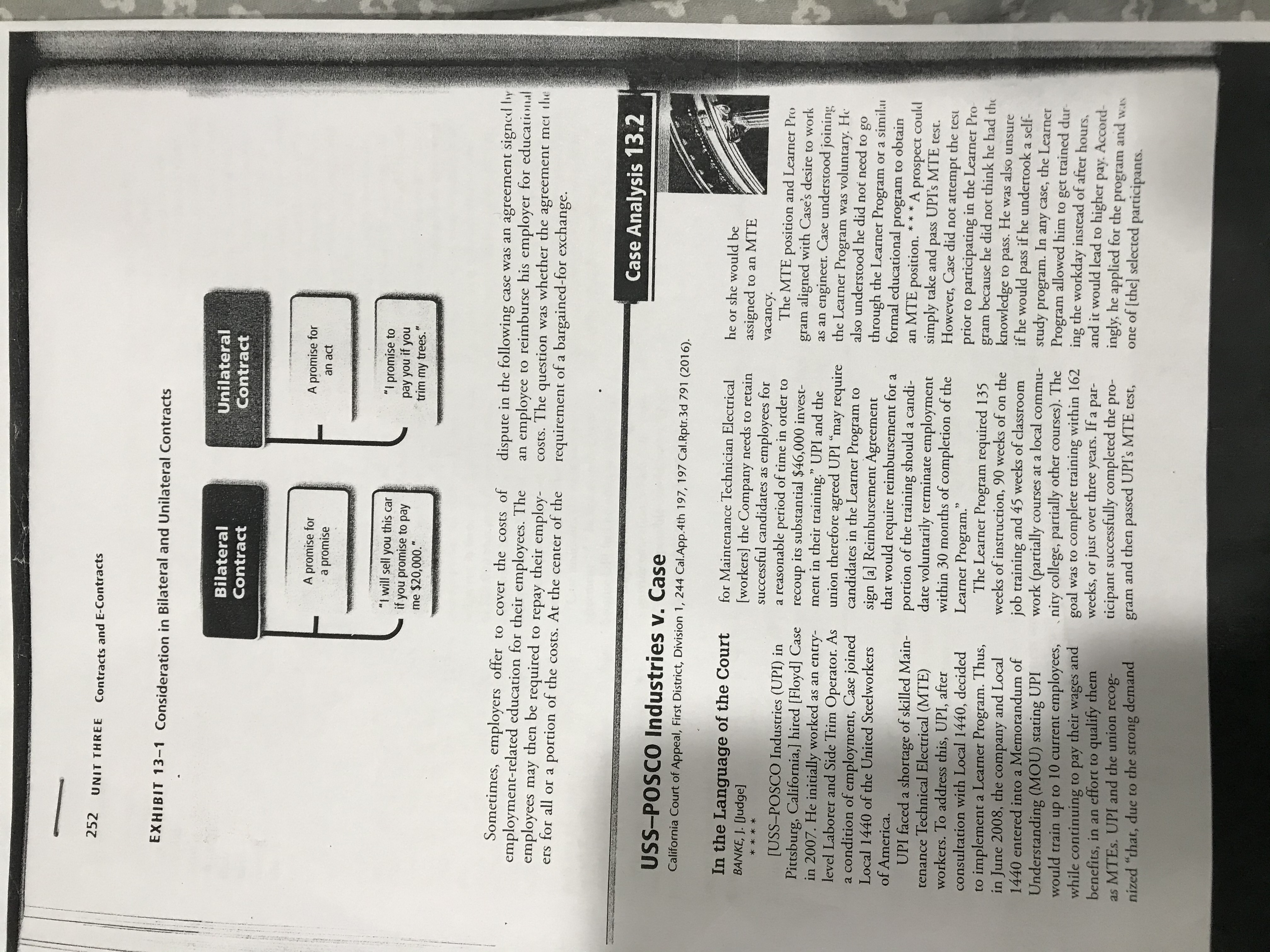1.What did Case view as "the only possible consideration" for his agreement to reimburse UPI for some of the cost of his employment-related education?
2.How did the court interpret Case's view of "the only possible consideration"? Why?
3.If UPI had simply offered to pay its employees' wages and training expenses during their participation in a program of instruction "subject entirely and exclusively to UPI's approval," would the element of bargained-for exchange have been met? Explain.
2 UNIT THREE Contracts and E-Contracts EXHIBIT 13-1 Consideration in Bilateral and Unilateral Contracts Bilateral Unilateral Contract Contract A promise for A promise for a promise an act "I will sell you this car " I promise to if you promise to pay pay you if you me $20,000." trim my trees." Sometimes, employers offer to cover the costs of employment-related education for their employees. The dispute in the following case was an agreement signed by employees may then be required to repay their employ- an employee to reimburse his employer for educational ers for all or a portion of the costs. At the center of the costs. The question was whether the agreement met the requirement of a bargained-for exchange. Case Analysis 13.2 USS-POSCO Industries v. Case California Court of Appeal, First District, Division 1, 244 Cal.App.4th 197, 197 Cal.Rptr.3d 791 (2016). In the Language of the Court BANKE, J. [Judge] for Maintenance Technician Electrical he or she would be * * * * [workers] the Company needs to retain assigned to an MTE [USS-POSCO Industries (UPI) in successful candidates as employees for vacancy . Pittsburg, California,] hired [Floyd] Case a reasonable period of time in order to recoup its substantial $46,000 invest- The MTE position and Learner Pro in 2007. He initially worked as an entry- level Laborer and Side Trim Operator. As ment in their training." UPI and the gram aligned with Case's desire to work as an engineer. Case understood joining a condition of employment, Case joined union therefore agreed UPI "may require Local 1440 of the United Steelworkers candidates in the Learner Program to the Learner Program was voluntary. He sign [a] Reimbursement Agreement also understood he did not need to go through the Learner Program or a similar of America. UPI faced a shortage of skilled Main- that would require reimbursement for a portion of the training should a candi- formal educational program to obtain tenance Technical Electrical (MTE) date voluntarily terminate employment an MTE position. * * * A prospect could workers. To address this, UPI, after within 30 months of completion of the simply take and pass UPI's MTE test. consultation with Local 1440, decided Learner Program." However, Case did not attempt the test to implement a Learner Program. Thus, The Learner Program required 135 prior to participating in the Learner Pro- in June 2008, the company and Local weeks of instruction, 90 weeks of on the gram because he did not think he had the job training and 45 weeks of classroom knowledge to pass. He was also unsure 1440 entered into a Memorandum of if he would pass if he undertook a self- Understanding (MOU) stating UPI work (partially courses at a local commu- nity college, partially other courses). The study program. In any case, the Learner would train up to 10 current employees, while continuing to pay their wages and goal was to complete training within 162 Program allowed him to get trained dur- weeks, or just over three years. If a par- ing the workday instead of after hours, benefits, in an effort to qualify them and it would lead to higher pay. Accord- as MTEs. UPI and the union recog- ticipant successfully completed the pro- gram and then passed UPI's MTE test, ingly, he applied for the program and was nized "that, due to the strong demand one of [ the] selected participants







